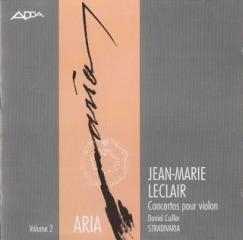Jean-Marie Leclair - Violin Concertos (Cuiller) [1995]
Jean-Marie Leclair - Violin Concertos (Cuiller) [1995]

Concerto op.7 no.4 F major 01. I. Allegro [0:04:25.72] 02. II. Adagio [0:04:55.23] 03. III. Allegro [0:03:36.70] Concerto op.10 no.1 B flat major 04. I. Allegro [0:04:44.25] 05.. Andante [0:03:45.07] 06. III. Giga (Allegro ma non troppo) [0:05:17.48] Concerto op.10 no.6 G minor 07. I. Allegro ma poco [0:08:08.47] 08. II. Andante (aria grazioso) [0:04:07.40] 09. III. Allegro [0:06:35.58] Concerto op.10 no.2 A major 10. I. Allegro [0:04:37.10] 11. II. Adagio [0:04:17.15] 12. III. Allegro ma non troppo [0:04:47.35] Ensemble Stradivaria Daniel Cuiller - violin and direction
The French violinist and composer Jean-Marie Leclair (often referred to as "the elder" to distinguish him from a younger brother who went by the same name) is remembered for an effective synthesis of his own Parisian musical heritage with the Italian sonata style brought into vogue by Corelli.
Born in 1697 to a French lacemaker and cellist, Leclair was considered a master of both the violin and his father's lacemaking trade by the time he reached adulthood. His skill as a dancer earned him a position with the Lyons Opera (1716 or perhaps a little earlier), and in the next few years it is probable that he either lived in or was a frequent visitor to Paris (an assumption scholars base on a 1721 Parisian musical publication which included ten of Leclair's violin sonatas). By 1723 Leclair had convinced Joseph Bonnier, one of France's wealthiest aristocrats, to publish his Opus 1 collection of violin sonatas, which were received with great admiration by the Parisian musical establishment.
Around 1726 Leclair found his way to Turin to study with violinist-composer G.B. Somis, as well as to compose ballet interludes (now lost) for opera productions at the Teatro Regio Ducale. A second opus of violin sonatas was published in 1728, and during that same year Leclair made his debut as a violinist at the Concert Spirituel. Performances of his own music in London, Kassel (where Leclair engaged in a musical "duel" with famed Italian violinist Pietro Locatelli) and Paris earned Leclair a reputation as one of the leading figures of the new French school of violinist-composers. Formal recognition came in 1733 with an appointment to the musical court of Louis XV, to whom Leclair dedicated his third opus of violin sonatas as a display of gratitude. --- Blair Johnston, Rovi
Last Updated (Wednesday, 10 April 2013 16:42)








